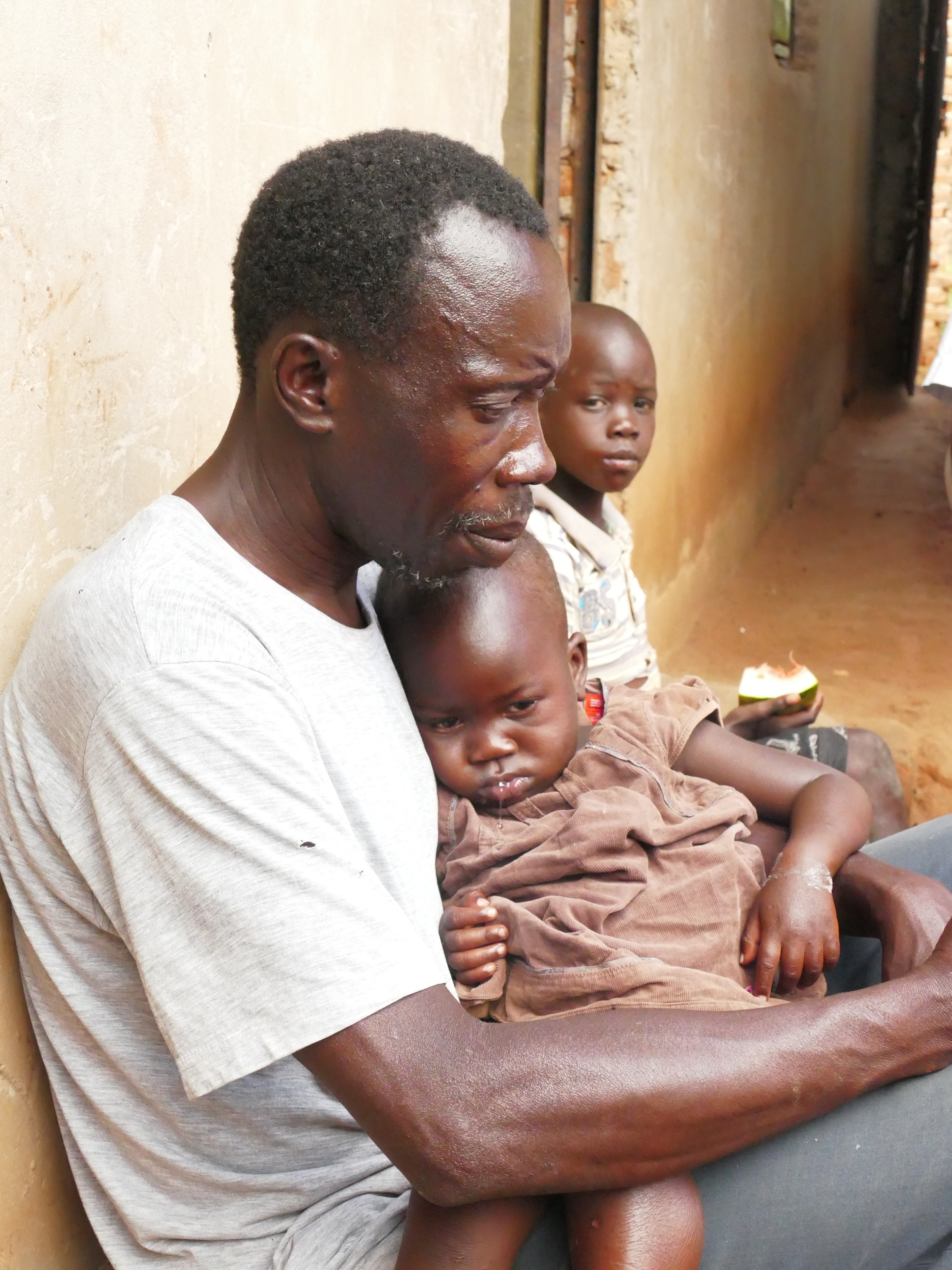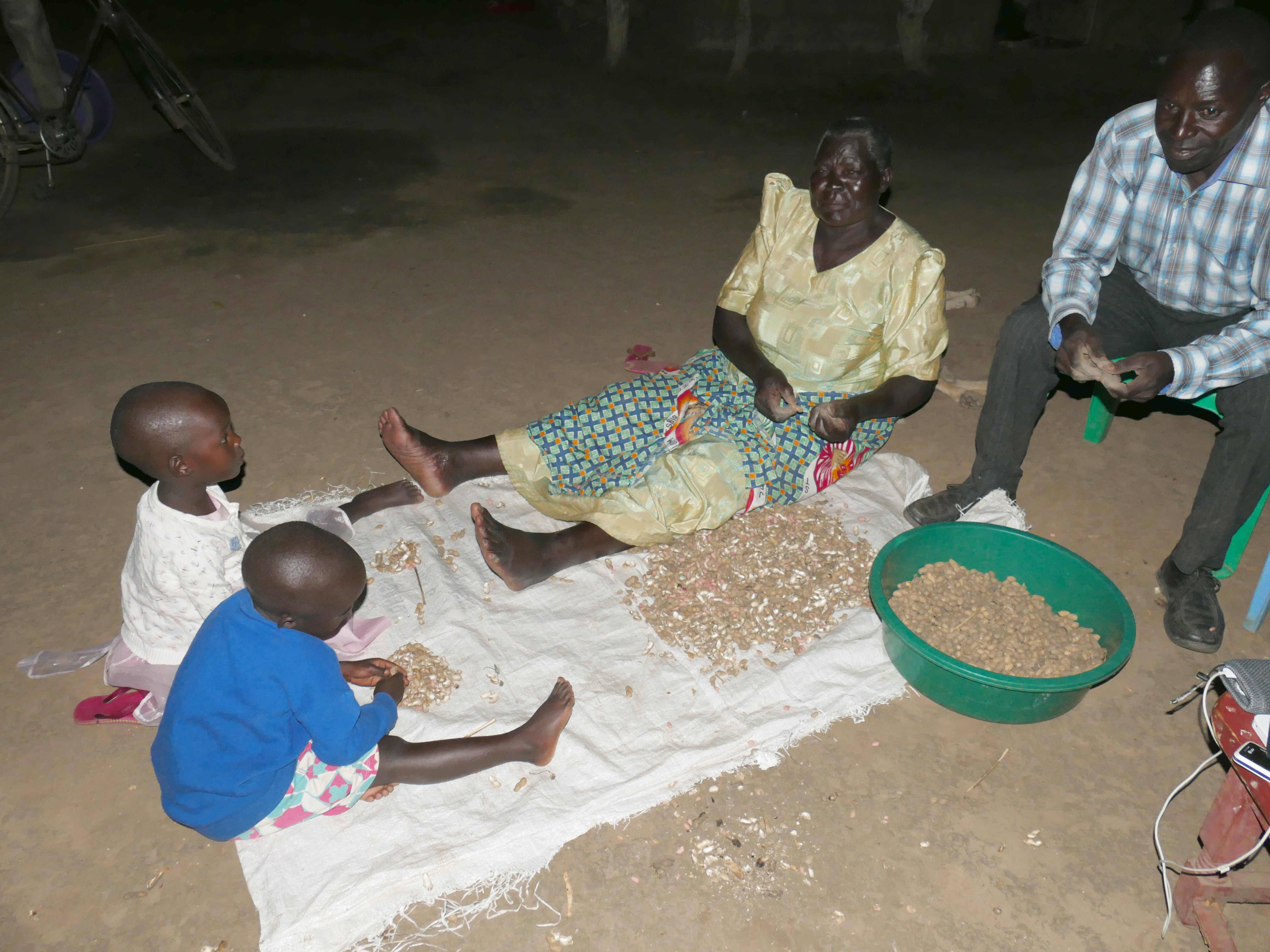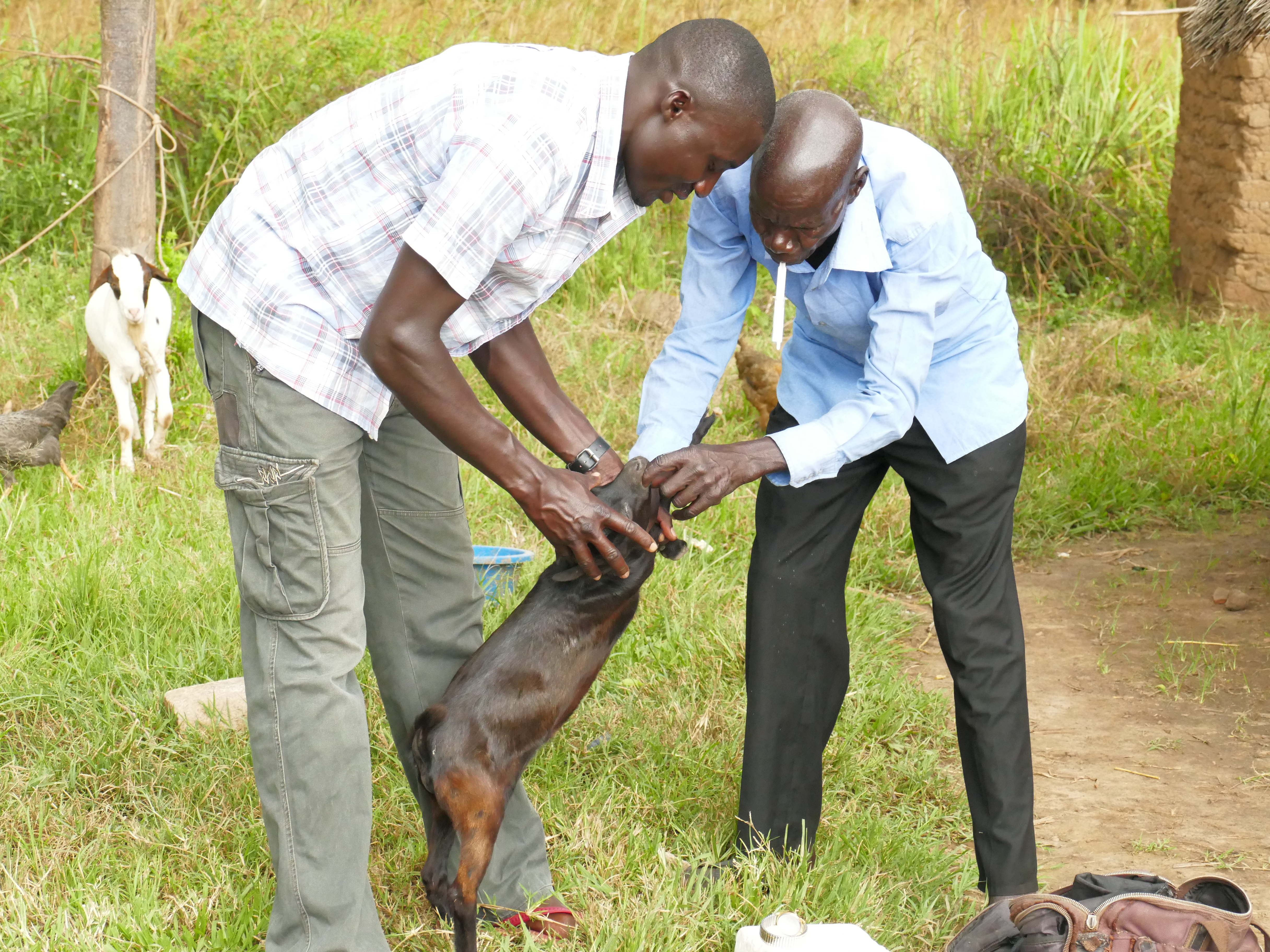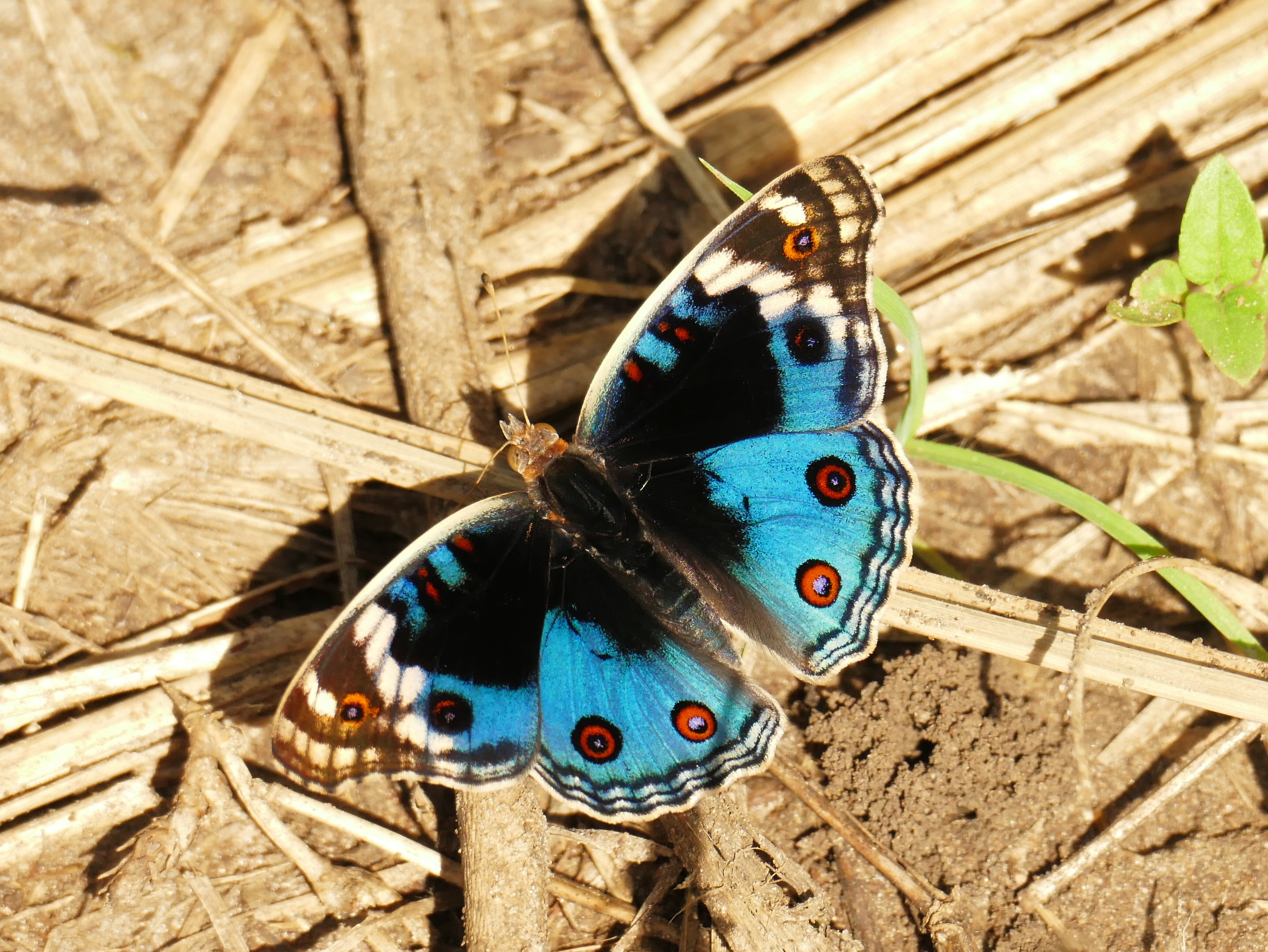Saturday to Wednesday, 9th – 13th Nov: Nyero and Tubur
There has been such weak network and internet signals that it hasn’t been possible to upload photos or post this until now, when I am back in Soroti.
Denis and I didn’t manage to leave Soroti until about dusk on Friday (8th) – and overshot James’ place by Nyero Rocks. We soon realised our mistake and were turning round when James phoned us as they had been waiting by the road and saw us go past!
It was very hot on Saturday morning when we walked with James, Julius (his most faithful teacher) and little Margaret aged just 2, past Nyero Rocks to the beautiful site where they have built dormitory blocks next to James’ original home. Both staff and students worked together. We couldn’t believe they did it in three weeks! They would have been completed if £1,500 hadn’t been “eaten” by one of his own staff. James is so upset and frustrated by it and is now stuck – and being threatened by that person for personal reasons as well. He has sent all the students home (only about two weeks early) for the long end of year holiday, while he hopes and prays he might somehow manage to complete the buildings in time for the start of the new year at the beginning of February.
Three years ago, when James was short of money to pay for his children’s school fees, he rented out his three houses which he had built himself (two of which are built up on rocks with lovely views) to the Korean Christians who built and run the nearby University. Because he was so desperate, he agreed to a five year contract in which they paid him the full amount, a pittance of 1.5m UGX (less than £375) for all three houses for five years, a woefully inadequate amount which he can do nothing about now – except wait until 2021 when he looks forward to taking the houses and the land back again and using them for his Training Centre.
- Doors, windows, floors and plastering still needed
- Only cement for the floor is needed, costing about £350
Denis has never seen the rock paintings. As he is planning to bring tourists there, we took him to two of the six sites. They are not painted on the walls of caves, as so many rock paintings are in other parts of the world, but on huge overhanging rocks which provide shelter. It was so cool, hidden amongst the rocks which have been perched, apparently precariously, on top of and against each other for hundreds of thousands, if not millions of years. Ngora and Nyero have so many of these amazing rocky outcrops which make you wonder how giant boulders have ended up high on top of other rocks. What mega forces and earth movements happened hundreds of thousands, if not millions, of years ago? Yes, I believe that all creation, which is continuously evolving, is God’s work, but not that God literally placed the rocks in these positions, as many people in Teso believe.
After lunch, Denis went back to Soroti while the rest of us talked. We discussed James’s future plans for developing the site, all of which is his own land. He wants to convert the original buildings next to the rock painting rocks into tourist accommodation and a restaurant which will be run by students and provide income for the Training Centre. The number of tourists, including many Ugandans and school groups, is increasing. Margaret wasn’t at all well, with a chest infection, so James took her to a clinic for treatment.
- Under one of the Nyero rocks covered with ancient paintings
- James carrying Margaret as she was sick
- Beehives made at the centre
- All the doors are made by students from old oil drums
- Rafaella bathing Margaret and washing the dishes
- James and Margaret
Personal and institutional development, and life generally, is so hard for the very few who try to stand up against corruption in a country where it happens at every level of all parts of society, including in the churches where it seems to be getting worse, especially because it is rife amongst the leaders at the very top. How can countries ever get rid of corruption when it is so ingrained? I think it can only happen by change at the top, including in the Police, working down because the people at the bottom are so poor and have no power or influence or choices when their families depend on them for the essential basics of life. How can a mother refuse to pay a bribe to get treatment for her very sick baby? Once again, I have been hearing so many disturbing stories about corruption and violence.
There is one family I know of where the wife (Immaculate) left her husband (Thomas) for another man several years ago, after years of unfaithfulness, leaving Thomas with several children who are mostly grown up. Thomas later took on Betty who had been abandoned by her husband, leaving her with two young children. Thomas and Betty have lived together for several years now and have another child together; they are very happy. However, Thomas’s third son is becoming very aggressive towards Betty and her children. He has been waylaying them on their way back from school and beating them and is also threatening to poison them unless Thomas gets rid of them all. The threats are very real. They don’t want to separate, but they feel the only way to ensure their safety is to move them away. But they can’t afford anywhere for them to go to.
The divisions within Kumi Diocese (in Ngora) are as real as ever and have come to the fore in the recent election of the new Bishop. Bishop Thomas Irigei, who has been bishop for 19 years, is retiring and is in poor health anyway, having had a leg amputated due to diabetes. But as in Soroti Diocese over the past 10 years, it seems that corruption and infighting are now rife and the first election failed. The second attempt resulted in Rev Charles Okunya being chosen, but not without opposition and concerns.
Denis was delayed coming back to Nyero so he stayed in Soroti, while James, Elizabeth and little Margaret walked with me, through cultivated ‘gardens’ and homesteads, to Kokas and Margaret’s home arriving just before sunset.
- Margaret on Elizabeth’s back & James walking to Kokas & Margaret
- We passed two little boys digging planting sweet potatoes
Sunday: Denis arrived from Soroti and we all went to Nyero church. Kokas later showed me his chicks which he had incubated nearby. Having retired about two years ago from being a parish priest and Archdeacon, he is starting to set up a family poultry business to supply both eggs and meat to a wide market. He still has a dairy cow (some of us gave him his first cow about twenty years ago) which he milks himself – I enjoyed the fresh milk.
- Stella received the mother goat from TESS when she was sponsored
- Music group in church playing adungus
I have known Kokas almost longer than anyone in Teso, having first met him in 1994. Stella, their eldest grandchild whose mother died while Kokas was staying with us in Wednesfield in 1998, came home for the weekend to see me. Our family sponsored her through secondary school and vocational training in plumbing. She has gone through a very tough time since her early teens, including severe depression which often wasn’t treated or managed properly, and then a disastrous marriage to a man who already had two wives and a number of children. Stella had three children with him, but he was just using and abusing her, often beating her badly. Over the last few years, she has found she can talk to Robert who is very compassionate and wise. She eventually left the man and went back to stay with Kokas and Margaret before going to live with Rachel, her aunt in Tororo, where she has settled well. She had to leave all the children with the man. However, although she would like to see them (but the man won’t allow her to), she believes they are being well cared for especially as she feels she is unable to manage to look after them herself. I wonder if, after suffering depression all through her teens, she has actually been suffering post-natal depression, especially with the last baby, so that she has never been able to cope with them or form a strong bond. She is just starting up a small business from Rebecca’s home, baking cookies to sell locally, and seems happier than I have ever seen her, so I hope this lasts. We brought her back to Soroti on Sunday evening so that she could see Robert again on Monday when he returned on the overnight bus from Kampala.
When we left Kokas and Margaret after lunch, we stopped at Ngora Deaf School to meet Charles Ekadit, the Headmaster. It was the first time for Denis, who was fascinated by the way he and the children all communicate with each other through sign language, and how quiet and peaceful the place is. I brought a simple a peg loom which Roger had made and lots of scraps of material (as well as scissors) collected by Margaret Bates and her sewing friends. We sat under a tree and showed him how to set it up and weave rag rugs, making a small sample, but none of us was convinced that he had really understood! However, he said he would ask James for help if necessary.
Earlier this year, a loud bang near Ngora town was followed by smoke coming out of a rock for several days, which caused great alarm as they feared a volcanic eruption, but it was deemed safe by geologists who came from Makerere. It was quite a mystery. So we decided to go and find it and see for ourselves. It was behind all the rocks of Ngora, along tracks I had never been on before, between Ngora and Kobwin. We had to keep stopping to ask for directions, but eventually ended up in a homestead where the women were very happy to take us to the nearby rocky outcrop to show us the crack that smoke had emanated from. There wasn’t much to see although the rock was different from many of the outcrops in that it was more like one vast rock rather than lots of rocks piled on top of each other. It was beautiful in the late afternoon sun, so we scrambled up to the top. The views were wonderful as we watched the sun set. We all loved it up there and were so pleased we had made the detour on our way to Soroti.
- Crack in the rock
- Stella
- Stella and Denis
Monday: It rained heavily again in the night. Why doesn’t rain always come at night?! After meeting up with Robert and having breakfast together, we went to the market to buy food for the next two days in the village. There were a few other things to do, including putting Stella on a “taxi” minibus to go back to Tororo. By then it was lunch time, so Robert and I had lunch at the usual local restaurant before setting off, first to see the new plot of land he has just bought just over the border in Kaberamaido district, not far off the main Lira road.
- Robert was very pleased with the hat he bought – but his father took it when we went home!
- This sign is stuck up all over Soroti
Robert is thrilled with his land and so excited about his plans for building his home there (grass-thatched huts in the first instance) and developing a small farm. It is situated near a swamp, so there will always be some water and pasture for his animals. He has already established friends there who are helping him plough some of it and plants cassava, and he has arranged for them to make some bricks from the anthills. His two boys, Sam and Ronny, will spend their long holiday there and build their own little houses whilst renting a room in the nearby trading centre. Robert will be with them whenever he can, but December is a busy time for driving tourists and he starts his new driving job in January, all of which will help him fund his plans and pay school fees again in February.
- Neighbours who are helping him
- Cassava growing already
- Some of the insects we saw there
We arrived at his home in Tubur to find Arakit and Daisy back home from school. Arakit is three and a half and Daisy, a distant cousin, also lives here. They are like twins and apparently never quarrel. They both disappeared in February (aged two and three) and were missing for at least four hours while everyone frantically searched for them. They were eventually found at school! They were both so keen to be at school that they are now there permanently, in the nursery class, and enjoying it.
Arakit was named after me. If anyone asks her, “What is your name?” she replies “Arakit Margaret Ruth Stevens”. She calls herself “the Muzungu (white person) from the village” and me “the Muzungu from town”! She was very shy the first evening, but that had gone completely the next day, when she and Daisy spent all their spare time with me, chattering away non-stop. Arakit is very big for her age, much taller than Daisy who is older.
Robert cooked dinner for us all, including his parents, while the rest of us sat outside shelling groundnuts. There was light from the full moon even though there were clouds covering it. It was nice to feel cool after such a hot day. The animals were all around us. The girls both have terrible colds and coughs, which I am hoping I won’t get! They both fell asleep on my lap – one at a time.
- Daisy and Arakit Margaret
- The girls helped shell groundnuts
- Robert cooking
Tuesday: It was a cool night. I slept well in my little house with a freshly smeared floor (dried cow dung) which has a hard surface and a pleasantly fresh smell. I heard the school bell in the distance at about 6.00 waking the children up in the surrounding area, but was pleased to go back to sleep while the little girls got up. I didn’t see them until they came home at lunch time, looking cute in their uniforms. Fortunately, the little ones don’t have to go in the afternoon.
It was lovely to have a quiet breakfast with Robert sitting in the shade of one of the houses, with goats, cows, chickens, dogs and a cat wandering around looking for food. He is intent on putting weight on me – he gave me toast and honey, lemon grass tea and then potatoes and pumpkin cooked with a few tomatoes and onions. I have spent a lazy day, catching up on my photos and diary while Robert was sorting out his animals and other things. He called the local veterinarian to come and de-worm the goats which are actually Becky’s goats, the products of the one goat (“Harriet”) that I gave her and the hen (which produced so many offspring which he sold to buy more goats) Robert gave her for her birthday when she was in Soroti with me about five years ago. Roz added to the herd last year by giving Robert a good hybrid male, “Frank”. Robert sold about seven of the goats last year and bought a cow for Becky, which is nearly old enough to be mated. So her livestock are increasing! A half-grown kid has amused us as it ‘carries’ a plastic chair on its back around the compound. At first, I thought it had got stuck under the chair and was just trying to get out. But it kept coming back, getting under the chair, lifting it and moving it across the compound!
- “Frank”, “Piriton” (Robert’s dog which he loves) & one of Harriet’s progeny
- “Harriet”, Becky’s original goat
The girls came back from school and had millet porridge for lunch. Who needs a sandpit when there is soft dry sand in the compound?!
It got very hot until it rained in the afternoon – a short, sharp storm, which made it quite chilly sitting outsidein the evening. The girls helped Betty collect up all the cassava which was drying in the compound, the chickens took shelter and there was just time for Robert and the old veterinarian to finish de-worming the goats before the storm broke.
- Daisy & Arakit watching the rain from inside ‘my’ house
- Robert’s father
- Robert’s mother
Wednesday morning was sunny and fresh, so Robert took me around his tree plantations – a long-term investment to pay for his children’s university education in the future. Once again, we saw a bird amongst his trees that neither of us has ever seen before in Uganda – an immature Greater Honeyguide this time. We picked oranges to take with us. [The people in Teso were told about 15 years ago to plant lots of orange trees because the government going to build a juice factory near Soroti. You now see orange groves everywhere. The juice factory, however, was much slower to materialise; it wasn’t even used when it was completed – until a few months ago. But guess what – they ‘import’ oranges from elsewhere in Uganda and won’t accept the oranges from Teso. So once again, Teso has been let down and people can’t find a market for all their oranges.] Robert sprayed all the animals against ticks, the girls came home from school, I gave them a few small things and we had lunch before setting off to Ococia for two days (Wednesday to Friday, 13th – 15th).
- Robert’s pine trees
- Immature Greater Honeyguide
- Ants making nests in the orange trees
- Robert picking his oranges …..
- …… and carrying them home
- Arakit in her school uniform







































































Really interesting, thank you.
I am sorry to read about the problems at James’ institute.
LikeLike
I so much enjoy reading these diary entries Margaret – thank you!
On Sat, 16 Nov 2019, 17:40 CROSSING CULTURES, FINDING FREEDOM, wrote:
> Margaret posted: “Saturday to Wednesday, 9th – 13th Nov: Nyero and Tubur > There has been such weak network and internet signals that it hasn’t been > possible to upload photos or post this until now, when I am back in Soroti. > Denis and I didn’t manage to leave Soroti un” >
LikeLike
I do so enjoy this glimpse of Uganda, Margaret!
God bless and keep you – and all whom you meet,
Anne
LikeLike